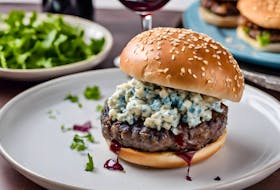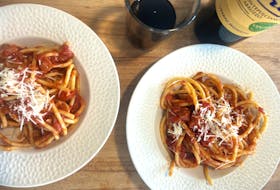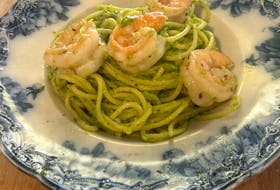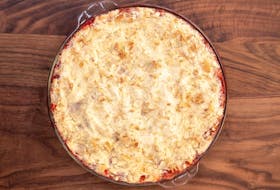Our cookbook of the week is Jew-ish: A Cookbook: Reinvented Recipes from a Modern Mensch by Jake Cohen. To try a recipe from the book, check out: Smoky devilled eggs , roasted chicken matzo ball soup and macaroon brownies .
Lighting candles, pouring wine, breaking bread. Author Jake Cohen found a community through hosting Shabbat.
He and his husband, Alex, arrived at “the OG dinner party” by chance. Looking for a way to delve deeper into Judaism, they came across the nonprofit OneTable on Instagram. Inspired by its non-prescriptive approach to Shabbat, they tried hosting and were hooked.
“It was one of the most incredible experiences,” says Cohen. “As soon as we did it, we just knew that this was it. This was what was missing on so many different levels.”
The practice became the catalyst for his first cookbook, Jew-ish (Houghton Mifflin Harcourt, 2021), in which he shares suggestions for those who want to start hosting Shabbat, as well as 100 recipes he developed and tested during two years of Friday night dinners.
“It’s not about belief in a higher power; it’s belief in your identity and a desire to want to preserve your family history,” says Cohen. “The way I celebrate Shabbat is going to be very different to the way my great-grandmother celebrated Shabbat, but that’s OK.”
Cohen studied at the Culinary Institute of America and cooked at restaurants including Daniel Boulud’s eponymous flagship in New York City before shifting to food media, working at publications such as Saveur and Tasting Table .
Coming from an Ashkenazi community in New York, Cohen had limited knowledge of other Jewish food cultures before he met Alex, who is Mizrahi. He initially found it strange that Alex didn’t know what babka was, Cohen recalls. But Alex pointed out that likewise, he hadn’t heard of kubbeh. (In Jew-ish , Cohen includes recipes for both the braided bread, with four filling options, and kubbeh shawandar hamudh, Iraqi beet soup with kubbeh, which are meat-stuffed dumplings.)
Through learning more about Alex’s Iraqi and Persian family traditions, adapting recipes from across the Jewish diaspora and playing with the Ashkenazi dishes he grew up with, Cohen developed a new respect for Jewish cuisine. Together, he and his husband explored ways of making these traditions and rituals their own.
The recipes Cohen shares in Jew-ish reflect this self-guided culinary education. Rooted in the concept of gathering with intention, he says, “This is a book about using food as a vessel for deeper connection.”
In putting his own spin on classic dishes, Cohen had modern home cooks in mind, including those who might be gearing up to host their first Seder (Passover feast) or Shabbat.
“I want all these recipes to be approachable for them, but also make them feel excited about Jewish food, which is not always the case but should be the case,” says Cohen. “If we can make kasha varnishkes into a weeknight pasta that people want to have on a regular basis, that’s a win for Jewish food and for the continual celebration of Jewish food.”
The pandemic may have reduced the number of people in attendance on Friday nights — and the height of “the crazy piles of dishes” waiting at the end of all that hospitality — but Cohen’s Shabbat dinners are still convivial. He has a “Marvelous Mrs. Maisel setup,” living in the same apartment building as his mother and sister, and has been cooking for his sister and her partner almost every night over the past year.
“We are so blessed that we do not feel the level of isolation that so many people are feeling throughout this pandemic because we’re able to still do Shabbat every Friday,” says Cohen. “We are a family of four right now and I love it. We do Shabbat and it’s small, and we are sometimes wearing onesies or pyjamas and taking it easy. And sometimes it’s just as elaborate as all the other ones; the only difference is that there aren’t a lot of people.”
Much like last year, Cohen is prepared to celebrate Passover differently. Under normal circumstances, he and his husband would host a family Seder of at least 15 people for the holiday, which begins the evening of March 27 and ends the evening of April 4.
In 2020, their celebrations took place via video chat and even though he was only cooking for four, a three-kilogram brisket was still in the mix. (Cohen includes two versions of brisket in the book: roasted tomato and French onion.) His favourite food, matzo ball soup, will be on the menu again this year along with enough brisket for plenty of leftovers.
Since his mother and aunt have received their COVID-19 vaccine, he’s hopeful they will be able to join his bubble of four. “It’s not going to be the same. It’s going to be what it is,” says Cohen. “But whatever it is, dayenu (it’s enough).”
Copyright Postmedia Network Inc., 2021








